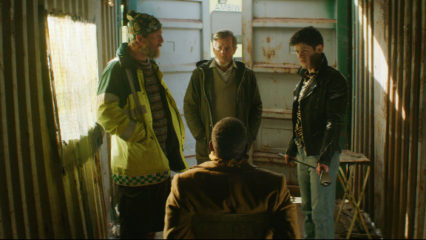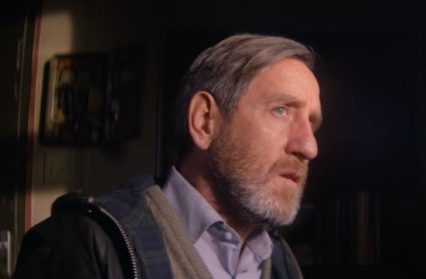Can Wales really fit into the mould of the classic Western film? Gareth Smith reviews Ryan Andrew Hooper’s The Toll, a dark comedy thriller set in Pembrokeshire.
“This had better be fucking good” is the opening line of The Toll, and expectations are indeed high. Films from and set in Wales remain a rarity and one described as “a modern Welsh take on the classic Western” might easily have slipped into broad caricature and cliché. Luckily, Ryan Andrew Hooper’s feature-length debut The Toll avoids the worst pitfalls of the “we’re all mad down ’ere!” genre and is instead a darkly-comic and sharply-written crime caper with affection, rather than condescension, for its setting and characters.
The transposing of Western themes and motifs into contemporary films is not a new phenomenon, but it does have a sense of novelty in the specifically Welsh context of The Toll. The twanging and whistling of the soundtrack works perfectly with the shots of vast and deserted landscapes, while the narrative itself, a story of grudges, grief and repressed rage, fits surprisingly well into the context of a rural village. This hybridity is perhaps epitomised in the use of a Western cover of ‘Yma o Hyd’ as a group of farmers set out for violent revenge. Other cliches are also explored, challenged or subverted; the ubiquitous ‘stony reception at a saloon’ scene is replayed in a cosy Welsh pub, demonstrating that the film is both aware of, and keen to lampoon, its cinematic antecedents.

The plot of The Toll – which loops and spirals in a manner befitting a Spaghetti Western – concerns a mysterious figure known only as “Toll Booth” (Michael Smiley) who, despite his lethargic and droll persona, appears to be masterminding a criminal enterprise from the claustrophobic confines of his seldom-used toll. Catrin (Annes Elwy) is the police officer trying to maintain order in the face of escalating chaos (and while driving around with the ashes of her father in the passenger seat). Both lead performances are pitched exactly right, playing up to the pastiche while avoiding full-on parody.
The use of several comedians in the supporting cast of The Toll (Paul Kaye, Evelyn Mok, Steve Oram) also contributes to the tongue-in-cheek tone and ensures several laugh-out-loud moments. Matt Redd’s script is packed with memorable quips; the robber who shouts “follow us on Instagram” as she flees the scene and the sign that reads “Welcome to Pembrokeshire – Where English People Come to Die” are reminiscent of the comedy that punctuates Martin McDonagh’s In Bruges or Seven Psychopaths. One of the highlights is newcomer Mr Henry (Oram) bemoaning the “foreigners who refuse to integrate” and claiming that “Wales is the only place the English have left”. Whether irreverent or cutting, this wry humour allows for several effective changes in tone in which funny situations are suddenly and violently undermined.
This desire to disorientate extends to the film’s chronology, which regularly jumps around and back in time. The winding narrative is framed by Toll Booth recounting the day’s events to Catrin, allowing for some postmodern comments on the tone, pace and perplexities of the plot. It builds to the expected and bloody shootout, tying its various loose ends and concluding with a meditation on fate, resolution and, conversely, the power of inaction. While there is always a fine line between playfully postmodern and pretentious, The Toll maintains its balance and offers a funny and fresh alternative to the usual Welsh filmic diet of Dylan Thomas biopics and industrial strife. It is, overall, pretty fucking good.
Ryan Andrew Hooper’s The Toll premiered on the 25th of February at Glasgow Film Festival.
Gareth Smith is a regular Wales Arts Review contributor.
classic western












